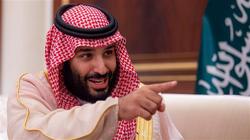 A group of Saudi rights activists, researchers and journalists have severely censured the ultra-conservative kingdom’s “corrupt” judicial system over shielding the masterminds of the killing of dissident journalist Jamal Khashoggi in Istanbul in October last year, describing Crown Prince Mohammed bin Salman as the primary culprit in the case.
A group of Saudi rights activists, researchers and journalists have severely censured the ultra-conservative kingdom’s “corrupt” judicial system over shielding the masterminds of the killing of dissident journalist Jamal Khashoggi in Istanbul in October last year, describing Crown Prince Mohammed bin Salman as the primary culprit in the case. RNA - The dissidents, in a joint statement, called the verdicts recently pronounced by a criminal court in the capital Riyadh on the case as “unfair,” saying, “The Saudi judiciary is corrupt and not independent. The main suspect in the case is the Saudi Crown Prince who is in control of the conduct of such trials.”
“This ruling is nothing but an attempt to conceal the truth, and is in line with the House of Saud’s policies as the regime does not want to stop its crimes and violations, and rather seeks to cover them up and even commit more. All pledges Saudi authorities have made about stopping human rights violations are, therefore, empty and no essential steps have been taken in this regard,” the statement read.
It added, “Torture, executions and arbitrary arrests continue, the prisoners of conscience have not been released, and the war on Yemen is still going on. All these developments point to the (Saudi) authorities' insistence and intention to press ahead with their violations and disregard to their earlier promises and pledges to solve the lingering problems.”
The dissidents then dismissed the Riyadh regime’s use of some members of Khashoggi’s family to whitewash the image of the judiciary and downplay the case, saying, “The case does not concern his family only, but is rather a public opinion issue. Jamal Khashoggi was not killed in a family quarrel. He was a political journalist, who used to criticize the political system. He was killed by the regime. The whole issue is political, not just criminal.”
The statement also called for “an international trial in which the defendants will appear before a fair and impartial court, attended by members of the media and human rights organizations, and that their safety is guaranteed so they can say what they know without any fear, especially about those who gave them orders to commit the crime.”
The Saudi dissidents also called on Turkish and US authorities to disclose whatever evidence and records they possess in regards to Khashoggi’s case.
In a televised press conference in Riyadh on December 23, Saudi Deputy Public Prosecutor Shaalan al-Shaalan announced the conclusion of the so-called trial in the Khashoggi case that had been closed to the public.
He said that out of the 31 suspects investigated in connection with the killing, 21 had been arrested and 11 put on trial.
Death sentences were eventually issued for five people and jail terms totaling 24 years were handed down to three others, he added, without naming any of those sentenced.
The remaining three, however, were found not guilty, including Saud al-Qahtani, a former top adviser to Mohammed bin Salman, Ahmed al-Assiri, an ex-deputy intelligence chief, and Mohamed al-Otaibi, who was consul general in the kingdom’s consulate in the Turkish city of Istanbul when the murder happened.
Both Qahtani and Assiri were relieved of their duties in the immediate aftermath of Khashoggi's assassination last year. Qahtani and Otaibi were also sanctioned a year ago by the US Treasury for their involvement in the murder.
Khashoggi — an outspoken critic of the heir to the Saudi throne — went into self-imposed exile in the US in 2017. The Washington Post columnist entered the Saudi consulate in Istanbul on October 2, 2018, to obtain paperwork he needed to marry his Turkish fiancée.
Inside Riyadh’s mission, he was confronted by a Saudi hit team, who killed him and brutally dismembered his body.
The CIA has concluded that bin Salman had ordered the murder. The journalist’s remains have yet to be found.
847/940